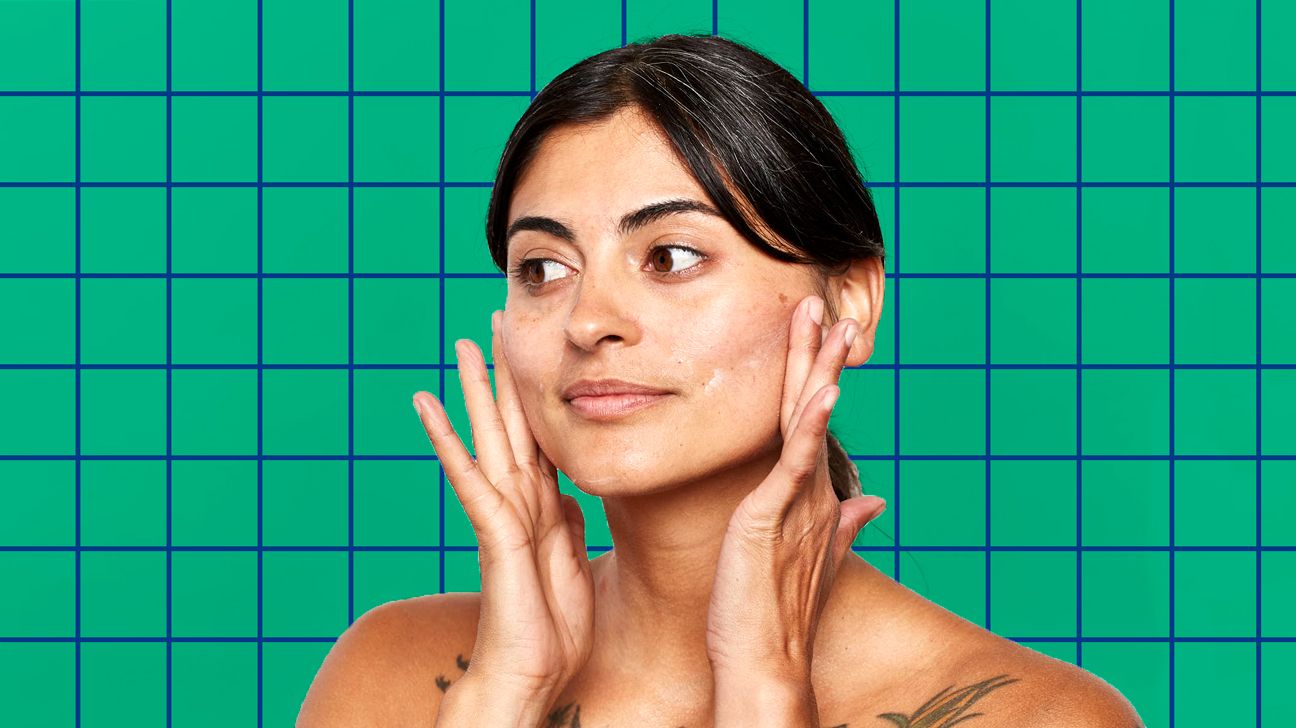Zinc pyrithione (aka pyrithione zinc) is a topical form of the mineral zinc that’s usually used to banish dandruff, but you may see it popping up as an acne treatment.
Thanks to its ability to fight fungus and bacteria, zinc pyrithione might help treat fungal acne, but there’s no evidence it can help zap other types of acne.
Here’s the deal on using zinc pyrithione for acne and other skin issues.
Research shows zinc pyrithione has antibacterial, antimicrobial, and antifungal properties (meaning it helps prevent bacteria, microbes, and fungus). Since all these annoying things can affect the skin, it’s often used to treat dandruff, and may even help eczema and psoriasis.
Zinc pyrithione’s main claim to fame is preventing unwanted yeast from growing, which is the fungus that causes dandruff. But aside from dandruff shampoos, you’ll also find it in face washes and moisturizers.
So far, there’s not a lot of concrete research to prove zinc pyrithione is a zit zapping superstar. But the thought is its ability to ward off bacteria and fungus can help prevent some types of acne (we’re looking at you fungal acne 👀). Its antimicrobial properties might also help combat inflammation and irritation that can make breakouts worse.

If you’re dealing with pesky fungal acne, here’s how using a product with zinc pyrithione may help.
- Fight fungus. Zinc pyrithione is known for its antifungal properties, which could make it especially useful for treating fungal acne.
- Reduce inflammation and fight bacteria. Its antimicrobial properties might help fight off bacteria, an OG cause of acne, and any inflammation that make pimples more irritated.
- May decrease oil production. Research from 2013 suggests that topical forms of zinc may help decrease oil production, which may help reduce the risk of clogged pores and pimples.
- Treats eczema and psoriasis. If you’re also dealing with dry, inflamed skin probs from eczema or psoriasis, zinc pyrithione has proven benefits. According to a 2014 study, using 2.5 percent zinc pyrithione twice a day is useful in treating plaque psoriasis. Some 2021 research also shows it can be an effective eczema treatment.
Since zinc pyrithione isn’t a proven treatment for acne-prone skin, you’re more likely to find other forms of zinc — like zinc sulfate — in acne products.
But you may benefit from using zinc pyrithione creams, cleansers, and even shampoos to help treat fungal acne or irritated, inflamed skin from seborrheic dermatitis. Here’s how to use different zinc pyrithione products.
Zinc pyrithione cream
Zinc pyrithione topicals are often found in the form of:
- pastes
- creams
- gels
These products are typically marketed toward treating conditions like seborrheic dermatitis (basically the eczema cousin of dandruff). Since zinc pyrithione is antifungal, it may work especially well for treating fungal acne.
With the approval of your dermatologist, you can apply these creams directly to the affected area as instructed.
Zinc pyrithione shampoo
Zinc pyrithione is an active ingredient in many dandruff shampoos, helping to prevent yeast and fungus that cause flakes.
If you’re dealing with fungal acne, your derm may suggest you use a dandruff shampoo formulated with zinc pyrithione and other fungus fighters as a topical treatment. Yes, we mean Head & Shoulders… on your face.
Basically, you’ll wash your face or body with the shampoo like your usual cleanser. Just be careful not to get it in your eyes.
Zinc pyrithione face wash
Zinc pyrithione face washes are typically marketed for treating seborrheic dermatitis, but they may also help fungal acne as a bonus.
The National Eczema Foundation suggests using a cleanser with 2 percent zinc pyrithione followed by a moisturizer every day to help treat seborrheic dermatitis.
Zinc pyrithione has been used safely in concentrations of 1 to 2 percent for treating dandruff.
Research from 2018 notes that zinc treatments, in general, tend to be low cost, effective, and lack side effects when compared to other acne treatments.
But, zinc topicals may cause unwanted side effects like:
- dryness
- skin peeling
- erythema (a red, inflamed skin rash)
There’s not much research on whether zinc pyrithione is safe to use during pregnancy, but in some rare cases, topical zinc has been linked to fetal defects. Pregnant folks should get the A-OK from a healthcare professional before using topical zinc.
Though zinc pyrithione is a trusted dandruff treatment, there’s limited research so far on whether it works to treat acne.
But its antifungal, antimicrobial, and antibacterial properties may make it useful for fungal acne. It’s also known to help treat eczema and psoriasis.
Talk with a dermatologist before trying zinc pyrithione to treat your acne. They can help you figure out the underlying cause and if it’s the right treatment.

